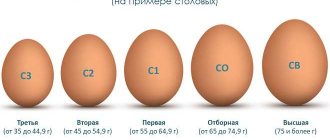Chicken eggs are present in the diet of every family. But this vitally important and necessary product for the human body can cause not only serious poisoning, but even death! Yes, it's that serious. However, such consequences can only be caused by ignorance. Therefore, be sure to carefully study the information on how and for how long to store chicken eggs at home, not only raw, but also boiled. You will learn the main storage methods and periods from our article.
Egg storage conditions
Contrary to popular belief, eggs do not need to be refrigerated.
The main thing is that the storage place should be dark, cool and dry. At a temperature of + 10-15 degrees, eggs are stored for up to six months, and in a cold place (at + 5-2 degrees Celsius) for up to 9 months. During storage, sudden changes in temperature should be avoided.
If you are going to store eggs for a long time, then select fresh eggs (preferably one day old), as pathogens have not yet developed in them. Eggs must have intact and clean shells, but not washed under water.
The fact is that the eggshell has a protective film - a protein cuticle, which protects the eggs from bacteria, in particular from dangerous salmonella. Therefore, if you do not store eggs in the refrigerator, you should wash them only immediately before eating.
Pay attention to nearby food and chemicals. Eggs easily absorb foreign odors, so you should not store them in a poorly ventilated area with strong-smelling spices, onions, fish, as well as kerosene, acetone, gasoline, etc.
Saving options
At home, protein products are stored in the refrigerator, cellar, pantry, or on a closed balcony. Keeping outside the refrigeration unit is limited in duration and requires compliance with a number of additional measures.
Without refrigerator
It is recommended to keep eggs in containers that do not allow light, moisture and pungent aromas to pass through, placing them in the container with the sharp end down. Protein ellipsoids with chips and cracks cannot be stored for a long time . Packages are stored in a cool, dry place. A fan is installed nearby with a stream of air directed at the product being saved.
To extend the period of detention, some housewives use a special technique. Egg shells are soaked in vegetable oil and placed in a wooden box, the bottom of which is covered with oats. The box is installed in a secluded, dry place with limited access to bright sunlight.
There are a number of other effective ways to save money outside of refrigeration appliances:
- The shell is coated twice with a layer of egg white , individually wrapped (after drying) in paper, and placed in a cardboard tray. The tray is installed in a cool room.
- Storage in a box filled with coarse salt.
- Treating the shell with melted wax (an additional layer protects against the penetration of putrefactive bacteria). After processing, store in a cardboard tray and store in a dry, dark place.
Is it possible to store on the balcony?
Storage on the balcony is permitted if the environmental conditions comply with regulated standards. In a closed balcony room with a relative air humidity of 75-90% , a positive temperature of 10 to 20 degrees, dietary eggs retain their properties for a week , table eggs - up to a month . At lower positive values (up to 10°), the shelf life increases. It is important to protect the stored product from direct sunlight, moisture, and warm air currents (which contribute to the formation of condensation).
Keeping in the refrigerator
It is not recommended to wash eggs before putting them in the refrigerator . They should be placed in the container with the blunt end up so that the yolk does not come into contact with the air bubble and remains in the center of the white. Cardboard or polystyrene trays are perfect for containers . It can be stored in plastic containers or placed on a metal stand.
It is advisable to place the egg tray on the first shelf (next to the freezer compartment or cooling holes). An acceptable option is storage in the vegetable compartment , which limits the access of aromas emitted by other food products. A specially equipped compartment on the refrigerator door is suitable for short-term savings. Opening the door is accompanied by the penetration of warm air, frequent exposure to which is not beneficial.
Are eggs stored in the freezer?
A favorable condition for long-term savings is cold, but not frost . Freezing raw (or boiled) eggs in their shell is not recommended. Freezing not only negatively affects the texture of the protein, but also leads to cracking of the shell, bacterial contamination and spoilage of the product. Only the contents extracted from the calcium shell (raw yolk, raw white, general whipped mass) can be safely frozen.
How to choose table eggs in the store
Eggs. This is a protein-rich dietary product, an excellent breakfast, and an ingredient in most salads. It is also indispensable in baking. Boiled, fried, in an omelet, in a bag - just how this simple product is prepared. Currently, stores have a fairly large selection of eggs. Therefore, the question arises - how to choose the right eggs?
How to make the right choice and not buy an old egg in the store? What do the numbers and letters on the label mean? What is the difference between white and brown eggs? These questions are often asked by ordinary people, lovers of this valuable product. So.
Classification of chicken eggs
On the shelves of Russian stores you can find 2 types of these products:
[/colonizer_wrap]
Now there are many types of eggs on the market, regardless of qualifications. There is a product enriched with selenium and iodine. Recently, double-yolk ones have become common.
Marking
According to GOST, all egg packages must be labeled. You can see the letter D on the product. This means that such eggs belong to the category of dietary dishes, which means they have lower calorie content. They can be stored for up to 7 days at sub-zero temperatures.
Eggs marked C . These are table eggs. These are the ones we usually consume.
Interestingly, any dietary egg becomes a table egg. A dietary egg is an egg straight from the chicken. It remains dietary for 7 days. Then it becomes a dining room. In addition, diet eggs have a smaller air sac under the shell.
Categories
There are the following categories of eggs:
- B – highest standard. These include eggs weighing more than 75 g.
- CO – selected. These are eggs weighing 65 - 74.9 g.
- C1 – first category. Such eggs weigh 55 - 64.9 g.
- C2 – second category. These are eggs weighing 45 - 54.9 g.
- C3 – third category. The smallest eggs. They weigh from 35 to 44.9 g.
How long do eggs last?
Homemade eggs remain fresh for 3 months, factory eggs - 1 month. Manufacturers usually indicate the date of manufacture directly on the surface of the shell. Chicken eggs come in dietary and table varieties. The former are consumed within a week after production, the latter – within 25 days. Over time, the amount of useful substances decreases, which is why such categories appeared.
It has been observed that brown eggs last much longer than white eggs because the shell is much thicker.
If all rules are followed, the product remains fresh for a whole month. The exact storage duration is determined by several factors. This includes the type of packaging, the condition of the shell, the use of chemical dyes, and so on. Let's name the shelf life of eggs in days depending on their variety:
- Raw – 30.
- Boiled – from 10 to 14.
- Soft-boiled – 2.
- Boiled, peeled or cracked – 3.
- Raw broken – 2.
- Easter ones, dyed with natural dyes – 15.
- With chemical dyes – 3.
- There are 4 in the film.
It is important not to forget about environmental humidity. It is recommended that this figure be within 85 percent. Otherwise, the product will become unfit for consumption. After cooking, be sure to look at the state of the protein. If the contents are gray or blue, it is better to throw it away.
Most likely the shell was damaged. The shelf life of the product cannot exceed 2 weeks in the refrigerator if favorable temperature conditions are created.
There is a simple way to determine the freshness of an egg. Submerge it in water. Then look at the result. If the egg floats to the surface, it means that air has accumulated under the shell. It is recommended not to risk your health and throw away spoiled food.
Why you shouldn't wash eggs before storing
Very often, squeamish housewives who care about health immediately after purchase wash eggs and store them in the refrigerator. In vain. We have already mentioned that eggs have a protective layer that protects them from salmonella and other infections. Washed eggs lose this layer.
Washed eggs can be stored outside the refrigerator for about 1 week . But definitely in a cool place. These eggs can last in the refrigerator for a maximum of 12 days . Whereas the unwashed will lie quietly for 25 days .
Best before date
The expiration date indicates that the egg should be eaten within this period of time. If you use the product after the end date has passed, you can seriously harm your health.
How is the expiration date of eggs marked?
Before you buy an egg, look at the stamp, which contains additional information in addition to the category and classification:
- expiration date and sorting date;
- manufacturers trademark;
- name of the poultry farm.
The period is indicated by numbers.
It is worth noting that the timing directly depends on compliance with the temperature regime and storage conditions.
What shelf life exist for different categories of eggs?
If we talk about grade, it does not have any effect on shelf life. It primarily depends on the qualifications of the product:
- dietary – 7 days;
- canteens – 25.
How to recognize expired eggs. What happens if you eat such an egg?
If you go to a store or market and don’t buy an egg without looking, be sure to evaluate the product visually. When examining, pay attention to the shell - in fresh ones it is matte. If you see that the shell has a glossy shine, then it has been lying on the counter for more than one day.
But you shouldn’t rely on this factor alone when choosing, since sellers can cheat and treat the product with anything in order to sell stale goods - they can wash the eggs or rub them with a soft rag.
Also, so as not to get a foul-smelling surprise when you come home, when choosing a tray, inspect the entire range of these products - the eggs should be the same not only in shine, but also in the shade of the shells. If you have a diverse product in front of you, then perhaps the seller mixed fresh and not so fresh eggs. If the purchase comes straight out of the box, this is what many supermarkets do. Smell - if there is an unpleasant smell - do not buy this product.
Interesting! A fresh chicken egg has a pleasant, but at the same time specific smell, reminiscent of the aroma of lime.
Shake a raw egg - you hear gurgling, it is not fresh and you should not buy it, since this product is unsuitable for consumption.
You cannot ignore the expiration date indicated on the label, since with these numbers the manufacturer guarantees the freshness of its products. It is worth not only buying a fresh egg, but also consuming it within the expiration date indicated on the package.
How to check the freshness of eggs?
When you have laying hens in your backyard, tracking the freshness of the eggs is not difficult. Store-bought eggs are usually marked with a sorting date. If there is no date, you can put the eggs in water and check their freshness. Fresh eggs will immediately sink, but those that have lain down will float or sink slowly. This happens because there is an air bubble in the blunt part of the egg. In a fresh egg it does not take up much space, but as it is stored, gases accumulate in the bubble and the egg sinks more slowly. For the same reason, when storing eggs, they are laid with the sharp end down: so that the air bubble does not move inside the shell, which will worsen the quality of the product and its shelf life.
How dangerous are eggs?
The main health hazard is not the eggs themselves, but the salmonella bacteria.
They live in the intestines of many warm-blooded animals. There they behave peacefully, but when they get into food, they become dangerous to humans. Salmonella causes serious diseases - typhus and salmonellosis. Their main symptoms are nausea, vomiting and diarrhea. They can be deadly to older adults, young children, and anyone with a weakened immune system or severe chronic illness.
Salmonella gets on the table with poorly washed vegetables, meat and eggs. In Russia, up to 50,000 people fall ill with salmonellosis every year.
For safety, the food that comes to stores (and these stores themselves) is constantly checked by sanitary services, but it will still not be possible to completely protect against bacteria.
At a temperature of 4 °C, the growth of salmonella stops, and if the egg is heated to 71 °C, all bacteria will die.
Eggs, for example, can contain bacteria both outside if they got on the shell and inside if the chicken was infected and salmonella entered the egg before the shell was formed. And the risk of infection depends on how these eggs were stored and prepared.
Although Salmonella becomes resistant to different drugs, it is still more or less the same everywhere. But the question of where to store eggs depends on how the country deals with them.
Storing table eggs
We’ve sorted out the categories and deadlines, it’s time to talk about how to properly store poultry farm products. So.
At room temperature
The practice of storing eggs without a refrigerator is still practiced in our time, in villages - where they are placed in dark, cool rooms. In an apartment, you can store the product without putting it in the refrigerator, but not more than 7 days. If you bought village eggs, then you don’t have to worry about their safety within the apartment for 2 weeks, but no longer. If you need to buy a lot of eggs, for example before a celebration, then this should be done no earlier than 6 days before the holiday.
In a refrigerator
First of all, for better preservation, you should not put the product in the cells on the refrigerator door. Eggs should be stored in stationary conditions, and the door constantly opens and closes, contacting warm air occurs, which is not very good for safety. Place the eggs in the fruit and vegetable drawer - this is the wettest and coldest place in the chamber. If there is no space there, then you can put them in cells, but you need to eat them in a very short time.
The most optimal temperature for long-term storage of eggs is considered to be 1-2 degrees, but if they were purchased in a supermarket, then it is better not to store them for more than a month. If the product is homemade, it will remain usable for 3 months.
Important! Table eggs should be boiled for at least 5 minutes, as this is the only way to kill salmonella bacteria that may be on the shell.
At what temperature can table eggs be stored on the balcony?
If eggs were purchased in early spring or autumn, they can be stored on the balcony, but do not forget that at sub-zero temperatures they can freeze. As soon as the thermometer scale drops below -1 degree, they should be brought into the apartment. You also need to make sure that they are not in direct sunlight, even if it is cool outside. Therefore, it is better to put them in a cardboard box or in a plastic bucket with a lid.
Other storage methods
There are many other household ways to extend the life of eggs. They will come in handy before the holidays, when the refrigerator is full of other products.
Traditional methods of storing eggs:
- Keep the product in a solution of potassium permanganate. The solution must be saturated. Dip the eggs here for a few seconds, then, without rinsing off the water, wipe the shells with a dry cloth. This way you can store eggs for 2-3 weeks under normal living conditions.
- Place in sweet water. For 1 liter of water you will need 1 kg of sugar. Dissolve the sand and boil the water. Soak the eggs in the syrup for a few minutes, then wipe and place in a container. The shelf life will last for several days.
- A very complex but effective method. Dip the eggs in liquid paraffin or wax. And then place it in a solution of liquid lime. It is prepared from the ratio: for 10 liters you need half a kilo of quicklime. Stir it well and pour it into a glass or ceramic container. Place eggs there. This is an ancient, rustic way to store the product when there were no refrigerators. Eggs can be stored this way for up to 6 months.
Different ways of keeping eggs will help you always have a fresh product, which is necessary for a variety of dishes.
How to check the quality and freshness of eggs at home
When choosing any product, the question arises about its quality and freshness. There are many ways to check the freshness of eggs. Let's look at them.
Checking in the store
- Labeling: Each egg must be stamped. The first sign usually indicates the shelf life, the second - its category. It is best to choose eggs that were laid the day before - this way there is a chance not to choose a rotten product.
- Shake: Take the egg from the package and shake it - a good product will not gurgle. If the egg gurgles, this is a sure sign that it has gone bad.
- Cancellation: There is another way to tell if an egg is fresh or not. To do this, you need a powerful light source (up to 100 W). Hold the egg up to the light. Isn't it translucent? Spoiled. Are there large clumps around the yolk? Spoiled.
- Shell: Pay attention to the shell. It shouldn't be glossy. A fresh egg has a matte shell.
If you have already purchased eggs and you are not sure of their freshness, there are several more ways to check the product.
- Water : Simply take a glass of cold water and place the egg in it. The fresh egg will sink to the bottom. An egg that will hang in the middle of the glass for a couple of weeks. The rotten egg will float.
- Breaking : The easiest way to ensure the freshness of an egg is visualization. Break it into a separate container - a stale product will emit a foul aroma of hydrogen sulfide. Consider the white and yolk - the white should not spread, and the yolk should not be flattened.
How to spot a bad egg
It is very easy to understand that an egg has gone bad - it will smell terrible. This product should be thrown away immediately. Moreover, the smell of hydrogen sulfide will persist even if the egg is boiled.
Also, pay attention to the white - an infected egg will have a pinkish, greenish or rainbow-colored white.
If you overlooked it and bought a cracked egg at the store, you shouldn’t risk eating it. When the shell is broken, rotting processes begin in the egg, and the salmonella bacillus will be happy to settle there. Don't risk your health.
It happens that a person eats a spoiled egg. In this case, poisoning cannot be avoided - after all, the egg is an incubator for various microflora, including pathogenic ones. Reactions to egg poisoning can range from mild stomach upset to severe infection followed by hospitalization.
When poisoned, a person experiences abdominal pain, nausea and vomiting, a fever may rise, and diarrhea may appear. You should not self-medicate. It is best to go to the hospital so that the patient can be given proper treatment.
The worst thing about consuming spoiled eggs is salmonellosis. Although, it can also be contracted by eating fresh eggs. That is why, right before use, it is necessary to thoroughly wash the egg and heat treat it. You should not consume store-bought eggs raw.
Possible consequences.
In the gastrointestinal form of the disease, hypovolemic shock, acute renal and cardiovascular failure may occur. Salmonellosis can also cause septic complications, which include:
- osteomyelitis;
- purulent arthritis;
- abscess of the kidneys, liver, spleen, brain;
- endocarditis;
- appendicitis;
- peritonitis;
- meningitis.
Against the background of egg poisoning, urinary tract infections, pneumonia, and in severe cases, toxic-infectious shock can occur.
Damaged products - how to identify
The following signs indicate damage:
- The appearance of a sulfur smell.
- When checked for transmission (in front of a powerful light source), the presence of a large air gap between the protein and the mineral shell is revealed, dark spots, blood rings or clots are visible.
- After removal from the shell, an altered state of the protein is detected - watery and transparent (at the same time, the yolk, which is round in its normal state, loses its shape).
Suitability is often checked using a simple experiment. The egg is placed in a glass of cold water. A rotten egg floats sideways and floats to the surface. The fresh egg remains at the bottom of the container . Food ingredients of questionable quality must be disposed of without regret. The use of low-quality products threatens bacterial infection, poisoning, and the development of serious pathologies.
Why is it not recommended to store eggs in the refrigerator?
Popular culture has instilled in us the stereotype that eggs need to be stored in the refrigerator. However, in Europe it is customary to store this product at room temperature. What's the matter? European biologists say that the temperature difference that occurs when opening the refrigerator leads to the appearance of microcracks in the eggs. Various microorganisms love to settle in them. To protect the product from dangerous damage, it is best to store it at room temperature. You should only use the refrigerator in cases where you need to increase the shelf life.
For incubation
Without compromising their quality, hatching eggs can be stored for 5-6 days under appropriate conditions.
The optimal temperature for storing eggs is +8-12°C , with a relative humidity of 75-80%. Such conditions are created in an egg warehouse - in a special room for storing eggs. Good ventilation is important, but there should be no drafts.
The position of the eggs during storage is also of great importance - they should be laid with the blunt end up. If eggs are stored for more than 5 days, especially in a horizontal position, they should be rotated 90° once a day.
In the table below you can see how the shelf life of eggs affects the hatching of young animals:
| Shelf life of eggs (days) | Percentage of young animals to the number of fertilized eggs | ||
| chickens | ducklings | goslings | |
| 5 | 91,6 | 85,7 | 79,8 |
| 10 | 82,5 | 80,0 | 72,7 |
| 15 | 70,3 | 73,5 | 53,7 |
| 20 | 23,5 | 47,2 | 32,5 |
| 25 | 15,0 | 6,0 | |
Read more about how to store eggs for incubation here.
Egg incubation is a process that requires strict adherence to certain conditions. We have prepared detailed materials on this topic for you. Read about storage temperature, the incubation process at home and the mode of this process.
Video about storing hatching eggs:
Chickens are not the only poultry whose chicks can be bred independently in a country house or farm. We bring to your attention a series of interesting materials about the incubation of eggs of turkeys, peacocks, turkey ducks, guinea fowl, pheasants, geese, ducks, ostriches, quails, and musky ducks.
Can eggs be stored on the balcony?
Sometimes it may happen that the refrigerator breaks down. How to store eggs in this case? You can leave them at room temperature, or you can put them on the balcony. But you need to be careful: if the balcony is not insulated and glazed, it is better not to take risks. It is possible for the product to simply spoil in the sun or freeze in the cold. But if there is a wooden box for storing food on the balcony, you can put the eggs there. Place the eggs in a cardboard box or pan and cover tightly. If it's cold outside, it's better to wrap the container.
In warm weather, eggs can be stored this way for up to 10 days. In cold weather, some housewives manage to preserve them for up to several months.
When choosing eggs in a store, you should always be careful, because despite all the benefits, they can be a time bomb. Follow our simple tips and you will never have to deal with poisoning or rotten food.
Quality check
If an egg is spoiled, what's the point in storing it? Therefore, it is quite logical to ensure the quality of the product before sending it for storage. When buying in a store, you need to carry out this simple check:
- inspect and feel the shell. In a fresh product it is slightly rough and matte. If the egg is shiny, smooth, and even looks bluish, do not take it under any circumstances;
- Take the egg in your hand and shake lightly. A slight vibration should be felt inside, but there should not be any gurgling. If the internal contents overflow, then it is better not to buy such a product.
The more tightly the eggs are packed, the more the supplier tries to hide them from the eyes of a potential buyer, the greater the risk of purchasing a low-quality product.
At home, before eating, it also doesn’t hurt to check the quality of the eggs. The easiest way is to drop one directly in the shell into a glass of water. If it “sinks,” it means you can eat it without doubting its freshness. If it floats slightly, but does not rise above the middle, then it is better to subject it to prolonged heat treatment. But if it comes up at all, then it’s dangerous to give it even to animals.
Home-cooked eggs can also be hazardous to your health. Even when taking them daily from chickens from your own chicken coop, you must check them for quality.
The first thing to do is take each one in your hands and examine it. Spots, soft shells, and microcracks should cause concern. This may be caused by health problems in the birds, but pathogenic microbes and bacteria penetrate through such shells very quickly.
It wouldn't hurt to look at the light for each testicle. There is a “puga” at the blunt end. This is the name given to the film that contains air. The larger and more voluminous it is, the older the product. You definitely need to look at the yolk. Normally, it is located directly in the center or slightly offset. It is unacceptable that it is blurry, has too dark a color, or, worse, the outline of an embryo.
Spoiled eggs should be thrown away. You should not engage in imaginary savings and give them to poultry or animals. This can cause poisoning and death.
Even if external signs indicate the freshness of an egg, it is necessary to evaluate it after breaking. The good one has a jelly-like white and a yolk that clearly rises above it. There should be no spots, drops or blood clots, or odor.
Why don't stores store eggs in refrigerators?
According to GOST, in places where the product is sold, eggs must be stored at a temperature from 0 to +20 °C and a relative humidity of 85-95%.
Sometimes stores leave eggs in the refrigerator. But more often we just see them on ordinary shelves. The thing is that eggs are not washed before selling. This is what allows them to be stored outside the refrigerator for up to 25 days. Nature provides that a thin invisible protective film is formed on the eggs, which protects them from various microbes.
What is the shelf life of washed chicken eggs?
Why is the shelf life of a washed egg so short? There is a thin film on top of the eggs that protects them from spoilage. By washing the egg, you wash off this film from it - the product becomes unusable much faster. Eggs should only be washed as a last resort, when there are obvious traces of droppings on them. If the egg is almost clean, wipe it with a dry cloth.
We recommend reading: How to store salt
Which is healthier?
Dietary eggs of categories D1 and D2 are considered the most useful. But, unfortunately, they appear on sale extremely rarely. Therefore, they need to be replaced with something.
As a rule, the familiar eggs with the letter C, table eggs, come to the rescue. But which category is better? It is believed that category C0 is the best eggs. This is wrong. O - these are selected eggs of large weight. This means that they are essentially “empty” inside - there is almost no use in them. In addition, they are quite high in calories - one medium egg will give you 100 calories.
C1, on the contrary, often do not want to buy. And this is a mistake. These eggs are optimal in the ratio of weight – beneficial properties – calorie content. 1 such egg will bring 84 calories.
Let's summarize. So, in order not to make a mistake with your choice,
- do not buy the largest eggs;
- choose 1 category;
- Don’t ignore categories 2 and 3 – they are useful.
How long can Easter eggs be stored?
The shelf life of chicken eggs in the refrigerator directly depends on the intensity of the heat treatment; the longer they are cooked, the longer they can be stored, but no more than a week.
It is worth understanding that coloring with natural or artificial dyes does not affect the shelf life. And the product in thermal film should be consumed within four days and no more.
How to store eggs in the refrigerator with the No Frost function
Often on the Internet you can come across concerns of people choosing a refrigerator. They are worried that a refrigerator with a No Frost system will spoil the food. This has happened before - food in such refrigerators dried out too much. This problem has now been eliminated and excessive dryness is no longer a threat to products. Traditionally, eggs were stored on the side door. However, this is not entirely correct.
Modern refrigerators are programmed to maintain different temperatures in different compartments.
So the most optimal storage place for eggs would be a shelf above or below the freezer. It is better to place the eggs in a closed container to prevent them from drying out (during long-term storage), and place them close to the back wall of the refrigerator - in the coolest place. This way the eggs will last longer.
Shelf life of hard-boiled and soft-boiled eggs
Everything seems to be clear with raw eggs, but heat-treated products can also be stored in the refrigerator. How long do boiled chicken eggs last in the refrigerator?
Before answering this question, it is worth finding out what method was used to prepare the product.
The degree of heat treatment will directly affect the shelf life:
- hard-cooked eggs will be normal after a week, but after this period they should not be eaten;
- lovers of the soft-boiled product should remember that it can be stored for up to two days and no more, in order to avoid severe poisoning.
Important! Eggs should be stored in the refrigerator after cooking only in their shells, which are pre-washed with a special product to avoid various diseases.
How to preserve for as long as possible
It is important to observe the shelf life of eggs, and when purchasing, look at the expiration date on the packaging and labeling . Never buy a product without these labels.
Shelf life of raw eggs in the refrigerator
They are stored in the refrigerator for up to 25 days at a temperature of about +2°C and a humidity of 85% . It is convenient to store in containers made of plastic or cardboard - they protect the product from the penetration of foreign odors. It is not recommended to store chicken eggs and smoked meat or sausage, citrus fruits, mushrooms, spices and aromatic herbs on the same shelf.
Attention! The shelf life of duck and goose meats should not exceed 14 days, and quail meats should not exceed 90 days. Boiled ones are stored for up to four days, without shells - up to two.
Can it be stored in the freezer?
Yes, you can store them in the freezer. Shelf life - up to a year. When freezing, it is recommended to observe the following rules :
- Break the chicken eggs into a plate and mix well. Sprinkle with a pinch of salt and sugar. Pass through a sieve and place in a plastic container or sealed bag. It is important to leave a distance of 2 cm between the product and the lid. At low temperatures the egg expands and the lid may slip off.
- Separate the white from the yolk and place them in different containers. Add a pinch of salt to the container with the yolk. The protein is stirred and passed through a sieve. They put a freezing date on the container and send it to the chamber. Storage period: no more than 60 days.
- If the eggs are boiled, then only the yolks are frozen. It is convenient to crush it and place it in a container for freezing ice.
How to keep things fresh at room temperature or on the balcony
At home or on the balcony, the eggs are wrapped in paper, placed in a basket and put in the coldest place . The shelf life under such conditions is no more than a week. Another way is to place the product in a saline solution (20 g of salt per 1 liter of water). Salt is a natural preservative; in such liquid the product will remain fresh for up to four weeks.
Boiled product
Of course, many housewives are interested in how to properly store boiled eggs. In its raw form, therefore, even at room temperature, such a product can remain fresh for a long time. Once boiled, eggs lose this property to some extent. After heat treatment, it is still advisable to store such food only in the refrigerator. Under room conditions, eggs in a whole shell will remain fresh for about 3 days (at a temperature not exceeding +20 ° C).
In the refrigerator at a temperature of +2 °C to +4 °C, such a boiled product can be kept for up to a week. At the same time, eggs can be stored in airtight containers under the same conditions for up to 14 days.
The exception in this case is soft-boiled eggs. They spoil much faster than hard-cooked ones. In room conditions, such eggs can remain for no longer than 24 hours until they lose freshness. They can be stored in the refrigerator for a maximum of 2 days. That is why at Easter it is recommended to boil eggs exclusively soft-boiled. After all, the Easter eggs will have to lie on a plate with Easter cake for quite a long time. Soft-boiled eggs under such conditions will most likely disappear. In any case, it will be unsafe to eat them.
Hard-boiled Easter eggs, by the way, can be stored a little longer than regular boiled ones. The fact is that the paint used to decorate Easter eggs clogs the pores in the shell. As a result, microorganisms that contribute to the deterioration of the contents of the egg cannot penetrate inside it longer. Easter eggs can be stored for up to 4 days.
If necessary, a similar method can be used to keep regular boiled eggs fresh longer. To extend their shelf life, their shells simply need to be lubricated with vegetable oil.
What does the date on an egg package mean?
The packaging date is indicated on the containers. That is, if the package says February 4, this does not mean that the chicken laid eggs on that day. This means that on February 4 the eggs were packed.
The date when the eggs were laid is indicated on the eggs themselves. On the packaging they write the date of release of products from the assembly line, that is, sorting. But be careful, it often happens that only the packaging date is indicated on the packaging, but the production date is missing. This is a serious violation.
Be careful, even if you bought all the eggs in one container. Among the majority of fresh ones there may be a couple of rotten ones.
Pay attention to the color of the markings. If the date on the egg is in blue, it is a table egg. If red - dietary.
People's secrets
Before the invention of refrigerators, folk secrets and tricks helped preserve eggs for a long time . Many of them are relevant:
- The eggs are placed in a bag and lowered into a pan with boiling water, after 5 seconds they are taken out and cooled, put in a cold place. They should lie with their pointed noses down.
- Place in a wooden box and sprinkle generously with coarse salt. Cover with newspaper and store for up to five weeks.
- Lubricate with Vaseline and put in a box. Store in a cool place for four weeks.











